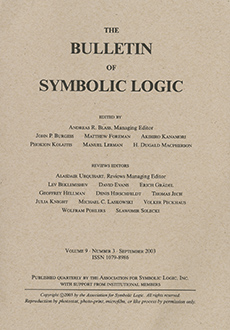Abstract
Schemata have played important roles in logic since Aristotle’s Prior Analytics. The syllogistic figures and moods can be taken to be argument schemata as can the rules of the Stoic propositional logic. Sentence schemata have been used in axiomatizations of logic only since the landmark 1927 von Neumann paper [31]. Modern philosophers know the role of schemata in explications of the semantic conception of truth through Tarski’s 1933 Convention T [42]. Mathematical logicians recognize the role of schemata in first-order number theory where Peano’s second-order Induction Axiom is approximated by Herbrand’s Induction-Axiom Schema [23]. Similarly, in first-order set theory, Zermelo’s second-order Separation Axiom is approximated by Fraenkel’s first-order Separation Schema [17]. In some of several closely related senses, a schema is a complex system having multiple components one of which is a template-text or scheme-template, a syntactic string composed of one or more “blanks” and also possibly significant words and/or symbols. In accordance with a side condition the template-text of a schema is used as a “template” to specify a multitude, often infinite, of linguistic expressions such as phrases, sentences, or argument-texts, called instances of the schema. The side condition is a second component. The collection of instances may but need not be regarded as a third component. The instances are almost always considered to come from a previously identified language (whether formal or natural), which is often considered to be another component. This article reviews the often-conflicting uses of the expressions ‘schema’ and ‘scheme’ in the literature of logic. It discusses the different definitions presupposed by those uses. And it examines the ontological and epistemic presuppositions circumvented or mooted by the use of schemata, as well as the ontological and epistemic presuppositions engendered by their use. In short, this paper is an introduction to the history and philosophy of schemata.
Citation
John Corcoran. "Schemata: the concept of schema in the history of logic." Bull. Symbolic Logic 12 (2) 219 - 240, June 2006. https://doi.org/10.2178/bsl/1146620060
Information





